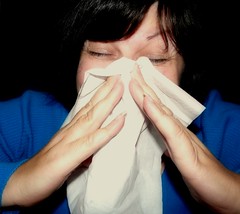7 March 2014. A clinical trial at Aarhus University in Denmark shows a small filter placed in the nose reduced symptoms of hay fever among allergy sufferers, compared to a placebo. The inventor of the filter, Peter Kenney, a doctoral candidate at Aarhus, and colleagues presented their findings earlier this week at a meeting of the American Academy of Allergy, Asthma and Immunology in San Diego, as well as in an article last month in the Journal of Allergy and Clinical Immunology (paid subscription required).
Kenney also founded the company Rhinix ApS in Aarhus, which is taking the filters to market. The Rhinix filters are about the size of a contact lens and fit inside both nostrils. The filters can be calibrated to various densities to stop specific allergens.
Hay fever, also known as seasonal allergic rhinitis, causes symptoms similar to the common cold: runny nose, itchy eyes, congestion, sneezing and sinus pressure. While the common cold is usually caused by a virus, hay fever is an allergic reaction to pollen, dust mites, pet dander, and other allergens found indoors and outdoors.
Kenney and colleagues from the lab of public health researcher and allergist Torben Sigsgaard tested the filters with 24 hay fever sufferers in an Environmental Exposure Unit, a chamber where allergic conditions can be simulated. The trial involved grass allergies, during the off-season when those allergies do not normally occur. Half of the 24 subjects were randomly given Rhinix filters to wear, while the other half of the sample received placebo nasal filters.
The symptoms of the test subjects were measured nine times a day for 15 days using a standard symptom ratings scale, including nasal congestion, nasal discharge, nasal itching, and sneezing. Results show subjects with the Rhinix filters had 45 percent fewer episodes of daily sneezing, 46 percent less itching, and 38 percent fewer reports of maximum sneezing.
The team looked also at breathing through the mouth rather than the nose, which causes more throat irritation. The results showed 75 percent fewer episodes of throat irritation, compared to the placebo. Air flow, however, did not show enough of a difference between Rhinix and placebo filter wearers to be statistically reliable.
Total nasal symptom scores — when summed across the individual indexes — were lower among Rhinix filter wearers by 21 percent. While maximum total nasal symptom scores were also lower for Rhinix wearers, the differences were not large enough to be statistically reliable. The researchers say the Rhinix filters were well tolerated and no adverse reactions were reported.
Sigsgaard says in a university statement that the next step will be to test the Rhinix filters in a larger population later in the year, working with the patient advocacy organization Asthma-Allergy Denmark.
Read more:
- Asthma Drug Helps Desensitize Multiple Food Allergies
- University, 23andMe Identify Genetic Allergy Associations
- New International Food Allergy Management Study Underway
- Genetics Company Lands NIH Allergies, Asthma Research Grant
- Advaxis, Karolinska Institutet to Collaborate on Allergies
* * *


 RSS - Posts
RSS - Posts